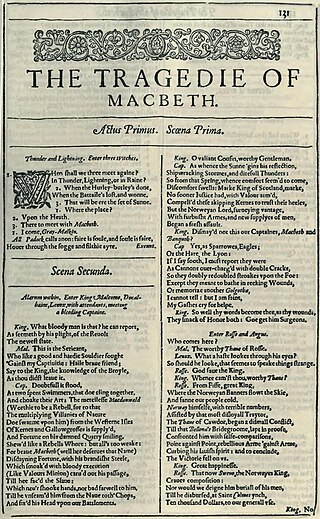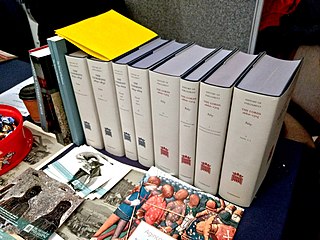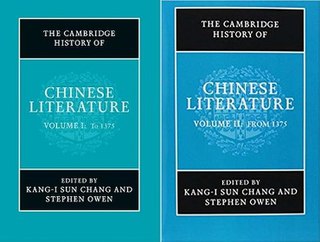
Macbeth is a tragedy by William Shakespeare. It is thought to have been first performed in 1606. It dramatises the damaging physical and psychological effects of political ambition on those who seek power. Of all the plays that Shakespeare wrote during the reign of James I, Macbeth most clearly reflects his relationship with King James, patron of Shakespeare's acting company. It was first published in the Folio of 1623, possibly from a prompt book, and is Shakespeare's shortest tragedy.

William Thomson, 1st Baron Kelvin, was a British mathematician, mathematical physicist and engineer born in Belfast. He was the professor of Natural Philosophy at the University of Glasgow for 53 years, where he undertook significant research and mathematical analysis of electricity, the formulation of the first and second laws of thermodynamics, and contributed significantly to unifying physics, which was then in its infancy of development as an emerging academic discipline. He received the Royal Society's Copley Medal in 1883 and served as its president from 1890 to 1895. In 1892, he became the first British scientist to be elevated to the House of Lords.

English Renaissance theatre, also known as Renaissance English theatre and Elizabethan theatre, refers to the theatre of England between 1558 and 1642.

Scottish literature is literature written in Scotland or by Scottish writers. It includes works in English, Scottish Gaelic, Scots, Brythonic, French, Latin, Norn or other languages written within the modern boundaries of Scotland.

A closet drama is a play that is not intended to be performed onstage, but read by a solitary reader or sometimes out loud in a large group. The contrast between closet drama and classic "stage" dramas dates back to the late eighteenth century. The literary historian Henry A. Beers considers closet drama "a quite legitimate product of literary art."

West End theatre is mainstream professional theatre staged in the large theatres in and near the West End of London. Along with New York City's Broadway theatre, West End theatre represents the highest level of commercial theatre in the English-speaking world. Seeing a West End show is a common tourist activity in London. Famous screen actors, British and international alike, frequently appear on the London stage.

A History of Philosophy is a history of Western philosophy written by the English Jesuit priest Frederick Charles Copleston originally published in nine volumes between 1946 and 1975. As is noted by The Encyclopedia Britannica, the work became a "standard introductory philosophy text for thousands of university students, particularly in its U.S. paperback edition." Since 2003 it has been marketed as an eleven volume work with two previously published other works by Copleston being added to the series.
Sir Edmund Kerchever Chambers,, usually known as E. K. Chambers, was an English literary critic and Shakespearean scholar. His four-volume work on The Elizabethan Stage, published in 1923, remains a standard resource.
The role and scale of British imperial policy during the British Raj on India's relative decline in global GDP remains a topic of debate among economists, historians, and politicians. Some commentators argue the effect of British rule was negative, and that Britain engaged in a policy of deindustrialisation in India for the benefit of British exporters which left Indians relatively poorer than before British rule. Others argue that Britain's impact on India was either broadly neutral or positive, and that India's declining share of global GDP was due to other factors, such as new mass production technologies or internal ethnic conflict.

The United Company was a London theatre company formed in 1682 with the merger of the King's Company and the Duke's Company.
The Cambridge History of China is a series of books published by the Cambridge University Press (CUP) covering the history of China from the founding of the Qin dynasty in 221 BC to 1982 AD. The series was conceived by British historian Denis C. Twitchett and American historian John K. Fairbank in the late 1960s, and publication began in 1978. The complete History will contain 15 volumes made up of 17 books with volumes 5 and 9 consisting of two books each.

The political history of Mysore and Coorg (1761–1799) is the political history of the contiguous historical regions of Mysore State and Coorg province on the Deccan Plateau in west-central peninsular India from the time of the rise of Haidar Ali in 1761 to that of the death of his son Tipu Sultan in 1799.

The political history of Mysore and Coorg (1800–1947) is the political history of the contiguous historical regions of Mysore state and Coorg province located on the Deccan Plateau in west-central peninsular India, beginning with the acceptance of British suzerainty in 1800 to the independence of India in 1947.
Redcliffe Hall was an early purpose-built playhouse on Redcliffe Hill, Bristol, England operating in the 17th century. It was built by Richard Barker, certainly before 1637 and possibly as early as 1604. Together with the Wine Street playhouse, Bristol thus had two purpose-built theatres, more than any other provincial city of the time.

The History of Parliament is a project to write a complete history of the United Kingdom Parliament and its predecessors, the Parliament of Great Britain and the Parliament of England. The history will principally consist of a prosopography, in which the history of an institution is told through the individual biographies of its members. After various amateur efforts the project was formally launched in 1940 and since 1951 has been funded by the Treasury. As of 2019, the volumes covering the House of Commons for the periods 1386–1421, 1509–1629, and 1660–1832 have been completed and published ; and the first five volumes covering the House of Lords from 1660 to 1715 have been published, with further work on the Commons and the Lords ongoing. In 2011 the completed sections were republished on the internet.
Stephen Edward Koss was an American historian specialising in subjects relating to Britain.

Literature in early modern Scotland is literature written in Scotland or by Scottish writers between the Renaissance in the early sixteenth century and the beginnings of the Enlightenment and Industrial Revolution in mid-eighteenth century. By the beginning of this era Gaelic had been in geographical decline for three centuries and had begun to be a second class language, confined to the Highlands and Islands, but the tradition of Classic Gaelic Poetry survived. Middle Scots became the language of both the nobility and the majority population. The establishment of a printing press in 1507 made it easier to disseminate Scottish literature and was probably aimed at bolstering Scottish national identity.

The Cambridge History of Chinese Literature is a 2-volume history book series published by Cambridge University Press in 2013. The books were edited by Kang-i Sun Chang and Stephen Owen. Volume 1 deals with Chinese literature before the Ming dynasty, and Volume 2 from the Ming dynasty onward.
Katherine Dunbabin is an archaeologist specialising in Roman art and Professor Emerita of Classics at McMaster University.
Greek Tragedy and the British Theatre 1660–1914 is a non-fiction book authored by Edith Hall and Fiona Macintosh. It was published on 15 September 2015 by the Oxford University Press. Chronological coverage is from the British Restoration to the early twentieth century.













